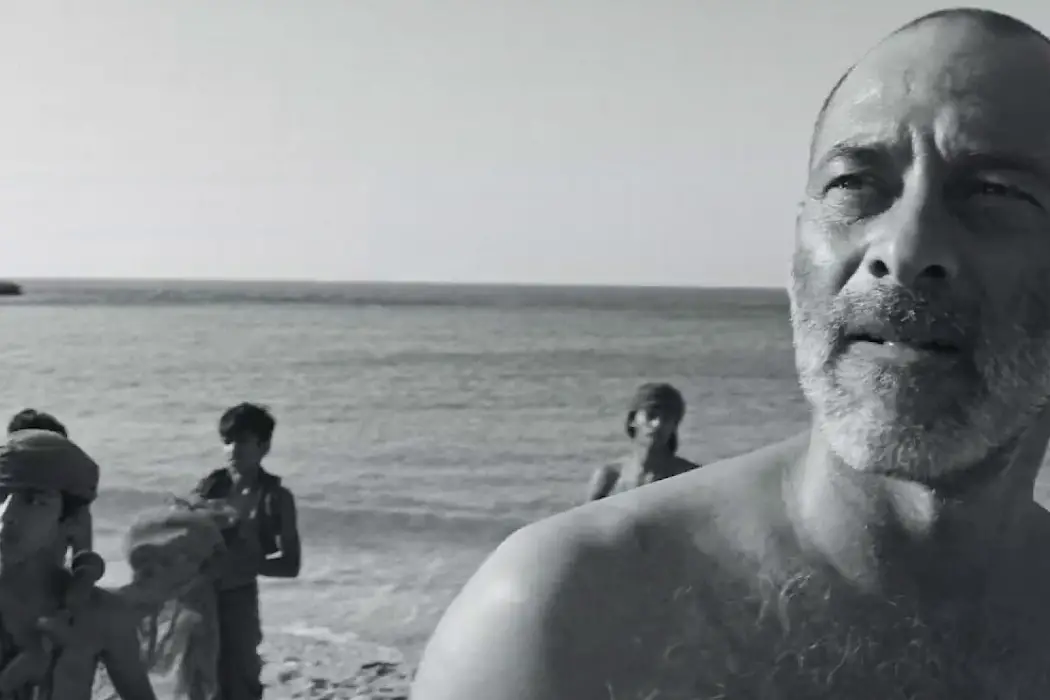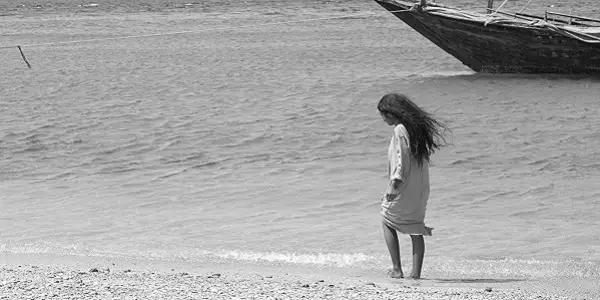SCALES: Emancipating the Monstrous Feminine

Lee Jutton has directed short films starring a killer toaster,…
The debut feature from Saudi Arabian filmmaker Shahad Ameen, Scales weaponizes repressed femininity in the form of a fable to push back against patriarchal society. Inspired by the story of Atargatis, a goddess of Syrian origin also known as “the first mermaid,” Ameen takes us to a harsh, dystopian island where the firstborn daughter of each family must be sacrificed to the sea. While Scales is hauntingly beautiful and contains a powerful thread of feminist anger, the story is sparse to a fault, barely summoning enough narrative to fill its already brief running time. Nonetheless, the film’s unique vision announces Ameen as a rising filmmaker to watch.
Breaking the Waves
In the dark of night, lit only by a couple of torchbearers, men approach the edge of the sea, ready to cast their infant daughters into the waves. Once in the water, these daughters will be transformed into mermaids, which are then hunted by the men and boys to feed the rest of their village; after being slaughtered for their meat, the rest of their remains are unceremoniously tossed back into the waves from whence they came. It’s a disturbingly bloody cycle that allows those who are born female one of only two fates: either give your life or live on to create more.
At the last minute, one man abruptly changes his mind, fishing his daughter out from the depths before the transformation can be completed. That baby grows up to be Hayat (Basima Hajjar), which fittingly means “life” in Arabic. Yet it’s not much of a life that has been bestowed upon Hayat, who bundles rags around one of her feet to hide the scales that exist as an eternal reminder of the fate she narrowly escaped.

Deemed a curse upon the village, Hayat is shunned by the other women and girls. Her own mother, pregnant with a second child, encourages Hayat to sacrifice herself now, telling her that even if the new baby is also a girl, “this child deserves to live.” Her father remains distant from her as well, ashamed of the emotional weakness that led him to save her so many years ago. Desperate to find a place where she can belong, Hayat asks the men and boys if she can join them on their hunting expeditions, but they refuse.
Trapped between girlhood and womanhood, humanity and monstrousness, Hayat exists in a world of perpetual body horror—but she refuses to give up. After her mother gives birth to a boy, Hayat is ordered into the waves to embrace her brutal destiny. However, Hayat has other plans for her life, and they don’t include being eaten by her own family.
Beneath the Surface
Scales was originally shot in color; it wasn’t until post-production that the film was converted to the ghostly black and white that makes it so visually striking. Shot on Oman’s Musandam Peninsula, the sparse, desaturated landscape can often make you feel as though you have been transported to the very ends of the earth; it has a timeless quality that makes Scales feel as though it could take place 500 years in the past or 500 years in the future—or even just yesterday. Because the film was not actually shot in black and white, there are some instances in which the exposure and contrast seem odd, including a few shots that appear almost washed out, but if anything that only adds to the haunting atmosphere that pervades the film.

Drawing inspiration from Arabic poetry, Ameen relies more heavily on image than on dialogue to tell her story, and one of the most compelling images at her disposal is the face of her leading actor. Hajjar doesn’t need to speak to convey Hayat’s stubborn refusal to accept either of the pre-approved paths society has laid out for her, or the deep internal conflict she feels when she decides to join the men in hunting the creatures she nearly became. The visual effects, including the scales that crawl up Hayat’s ankle and the salt-encrusted, almost primeval mermaids, are excellent in their small flashes (and no doubt aided in their realism by the transition to black and white). One scene, in which a mermaid crawls slowly across the deck towards a motionless Hayat, reaching out to her in what appears to be a gasping, voiceless cry of recognition, is disturbingly effective. Later, Hayat informs the lead fisherman, who killed the mermaid, that it was his daughter.
Yet despite several such spellbinding moments, Scales doesn’t sustain its power for the entirety of the film. While the film is only 75-minutes long, it feels much longer; the overall effect is that of a short film stretched out to feature-length, with moments of true imagination connected loosely by beautiful shots of Hayat gazing out to sea. The narrative is minimalist and the characters are only roughly sketched out, including Hayat, which means it’s often difficult to ascertain why they’re doing certain things; their motivations are as clear as the murky, mermaid-filled water that surrounds their island. Because of this, Scales often loses focus in the latter half of the film, and Ameen’s message—that women are more than their bodies and deserve autonomy in this world—gets lost in the waves.
Conclusion
Ameen’s compelling vision and her voice as a Saudi Arabian woman filmmaker are deeply necessary, but her work needs a better narrative framework than that of Scales in order to be truly effective. I look forward to seeing what stories she decides to tell next.
What do you think? Share your thoughts in the comments below.
Scales opens in theaters on July 9, 2021 at the IFC Center in New York and at Laemmle’s Royal in Los Angeles, with rollout to follow.
Watch Scales
Does content like this matter to you?
Become a Member and support film journalism. Unlock access to all of Film Inquiry`s great articles. Join a community of like-minded readers who are passionate about cinema - get access to our private members Network, give back to independent filmmakers, and more.
Lee Jutton has directed short films starring a killer toaster, a killer Christmas tree, and a not-killer leopard. Her writing has appeared in publications such as Film School Rejects, Bitch: A Feminist Response to Pop Culture, Bitch Flicks, TV Fanatic, and Just Press Play. When not watching, making, or writing about films, she can usually be found on Twitter obsessing over soccer, BTS, and her cat.













